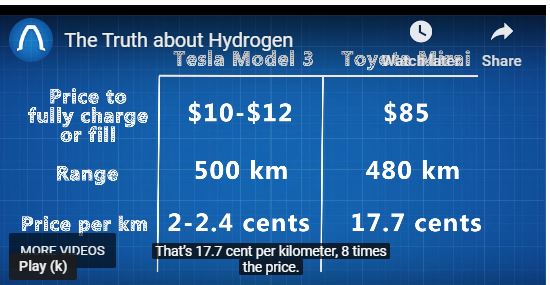Ev is a dead end in terms of practicality purely due to distribution problems
Also worth noting, you can use this liberated hydrogen and bond it easily to carbon capture co2 to create synthetic methane and liquid fuels for things that can't be hydrogen on ev powered - like planes. Therefore you are only releasing co2 that has previously been captured!
From Simons post above
The real reason that Hydrogen (H2) is not much considered for engines has to do with the thermodynamic efficiency of engines vs. fuel cells.
1 gallon of gasoline has an energy content of about 130 MegaJoules (MJ).
1 kg of H2 is in the same range (130–140 MJ).
At first glance, it would appear that they are pretty much equal, except that H2 costs several dollars per kg just to produce ($4.50, according to the National Renewable Energy Laboratory), which must be done using renewable energy as the original power source if we are to get any real benefit from using the H2.
However, an internal combustion engine (ICE) running on gasoline (the Otto cycle) or Hydrogen operates at thermodynamic efficiency level of around 20–25%.
On the other hand, a fuel cell that converts H2 and Oxygen into electricity to feed an electric motor operates at an efficiency level of 60% or even greater. Gasoline (or diesel) cannot be used in a fuel cell.
Putting these facts together, we see that 1 kg of H2, used in a fuel cell to power an electric motor is equal to 2.5 to 3 gallons of gasoline, and even greater for urban driving conditions.
The result is that the fuel cost per mile is equal when the price (at the pump) for 1 kg of H2 is about 3 times that of 1 gallon of gasoline.
https://www.forbes.com/sites/quora/...urers-ignoring-hydrogen-engines/#75abec5f4027









































